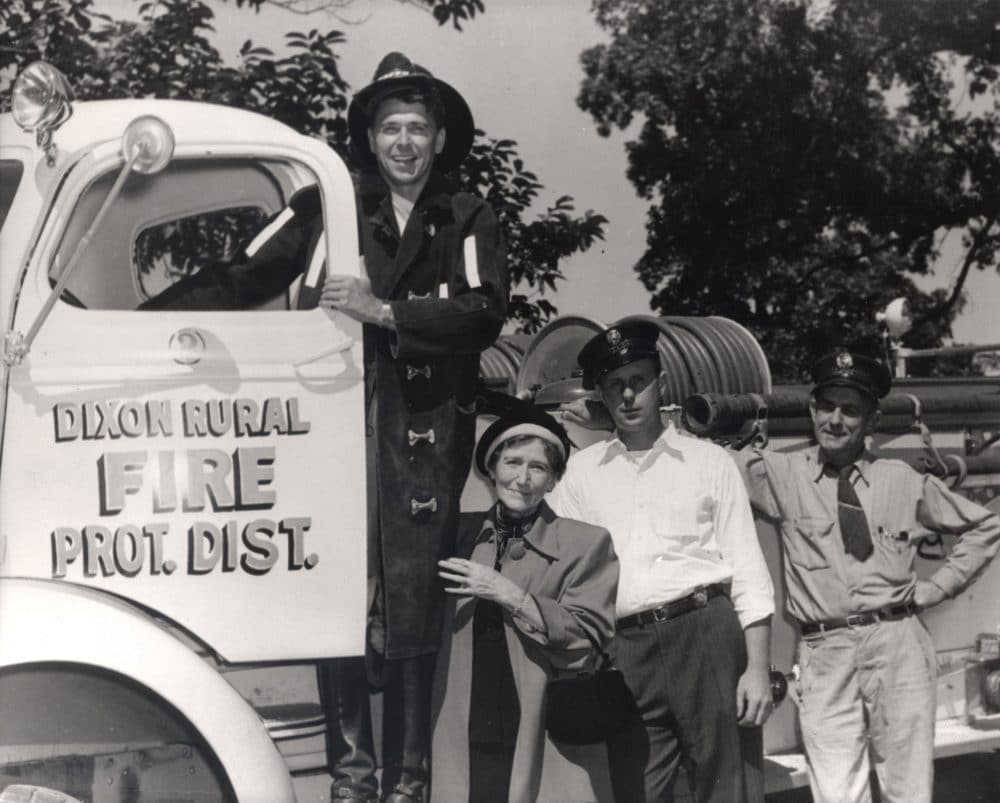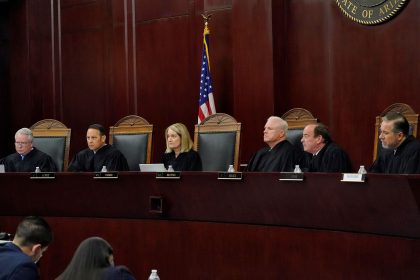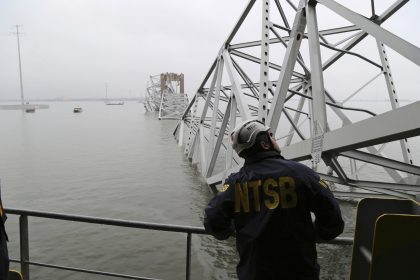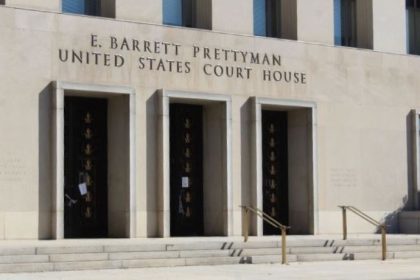The Town That Raised Reagan Wants Out of the War on Drugs
Part I: Peace With Honor

Opioids have overwhelmed rural Illinois. Desperate, the cops in Ronald Reagan’s hometown have stopped arresting people and started getting them help. In an exclusive series, The Well News looks at “Safe Passage,” a program that radically rethinks America’s War on Drugs. Read Part II:A Failed State, How Illinois’ Opioid Crisis Collided With a Political Crisis, Part III: Doctor Zero, How a Single Doctor Became His Own Opioid Crisis, and Part IV: ‘The Other Side of Me,’ How One Woman’s Redemption Offers Hope to Countless Others.
Dixon, Ill. — In October 1982, President Ronald Reagan braced his fellow Americans for an expanded war. First Lady Nancy Reagan by his side, he promised the country the time of indecision had passed and that — full of lethal cunning though the enemy may be — victory was at hand.
“The mood toward drugs is changing in this country,” Reagan said, “and the momentum is with us. We’re making no excuses for drugs — hard, soft or otherwise. Drugs are bad, and we’re going after them. As I’ve said before, we’ve taken down the surrender flag and run up the battle flag. And we’re going to win the war on drugs.”
Almost four decades on, the country’s “mood toward drugs is changing” again. Here in Dixon, just a few blocks from Reagan’s boyhood home, the police have struck his battle flag.
“The war on drugs is not working,” Dixon Police Det. Jeff Ragan tells me. “If this was a corporation, we’d already be bankrupt.”
Three years ago, Dixon became one of the first police departments in the country to stop arresting people for petty drug offenses and to start getting them to rehab. The town launched a program it calls “Safe Passage,” where addicts can bring their drugs to the police department, at any time, day or night, with no fear of arrest. Officers help them fill out intake forms and then volunteers drive them to the nearest available treatment center.
It started small, but as word spread and success grew, locals have begun to write grants and to seek donations. There’s a multi-town task force now made up of cops, prosecutors, judges, social workers, nurses, doctors and other community notables that meets regularly to discuss problems and look for answers.
No one argues for harsher measures, Ragan says.
Pent-Up Demand
Ragan is of medium height but powerfully built (he wrestled in high school and still seems as though he could go a few periods on the mat). He has a wee paunch, which he covers with an untucked denim shirt. He keeps his hair close cropped but his reddish-brown whiskers grow thick, and he walks with a slight bow in his legs. It gives the effect of a slightly rusted oil drum walking toward you. He looks, in other words, like an unlikely candidate to trade taking doors in drug raids for filling out multicolored intake forms, or walking up to people he thinks might be strung out and asking, “Do you need help?”
But Ragan spent the first decade-and-a-half of his career taking doors and busting people for drugs. It didn’t seem to make a dent, he says. In 2015, three young Dixonians died of opioid overdoses in the space of 10 days.
Ragan says he and his colleagues were open to new ideas. His chief heard about a program in Gloucester, Massachusetts, that the local cops called PAARI — the Police Assisted Addiction and Recovery Initiative. No one on the force objected to trying it out, Ragan recalls.
Even before Dixon police formally launched Safe Passage, people showed up at the department, having heard rumors that the cops were trying something different, and asking for help. The police couldn’t keep up with demand. “I don’t know how word got out,” he says.
There are many ways in which Illinois’ war on opioids is similar to every other American place’s struggle against opioids: gutted industries, rising poverty, an aging and ailing population and cheap, readily available drugs have brought towns like Dixon to the verge of social collapse.
There are places worse off than Illinois. But Illinois is catching up:
- Overdose deaths leapt by more than 34% between 2015 and 2016, one of the highest increases in the country, according to the most recent federal data.
- Trips to Illinois emergency rooms jumped by nearly 66% between 2016 and 2017, federal data show.
- Between 2013 and 2016, heroin overdose deaths nearly doubled, and prescription opioid overdose deaths nearly quadrupled, state public health data show.
‘There’s No One Hero’
Dixon is a small town of about 15,000 in northwest Illinois, about an hour-and-half west of Chicago (via the Ronald Reagan Memorial Tollway), on the banks of the Rock River. Unlike nearby towns trapped in rotting sarcophaguses of their Rust Belt infrastructure, Dixon has been aggressive in its redevelopment. The town’s riverfront, with its locally owned restaurants, its (locally) famous “Arch,” its cheery signs for the Petunia Festival (and, of course, the big, brown, silhouetted signs leading you to the “Ronald Reagan Boyhood Home”), might pass into any travel brochure under the heading of “quaint.”
But the opioid crisis has handed this area a staggering butcher’s bill. Between 2010 and 2015, opioid overdose deaths in Dixon’s Lee County jumped by nearly 108%, state public health statistics show. In neighboring Whiteside County, about a 10 minute drive west of Dixon, overdose deaths jumped by 361 percent, state data show.
This is only counting deaths. There are also the crimes petty and grand, the kids abandoned to foster care (or worse), delinquency and dropouts, the jobs lost, the public and private dollars spent on treatment and rescues — everything, in other words, that Ronald Reagan saw when he first called Americans to the colors for the war on drugs.
“Once someone becomes addicted it changes the dynamic of every relationship they have — in their job, in the family and in their social life,” says Natalie Andrews, a social worker who sits on the Safe Passage task force with Detective Ragan. “It becomes pervasive. It’s kind of like the disease swallows them.”
Andrews spent most of her career arguing for the kind of public health approach to drugs that Safe Passage embodies. The question now is whether these small towns can find the emotional and financial resources they need to pull it off. “There’s hope for changing that life, but it takes a broad commitment from everyone and it’s not cheap,” Andrews says. “It’s not just a matter of ‘just saying no,’ as Nancy Reagan used to say. There’s no one hero in the community that’s going to step up and fix this.”
“We’re still losing people,” she adds. “I mean, people are still dying. That’s why we need to persevere on this issue.”
Part II: A Failed State, How Illinois’ Opioid Crisis Collided With a Political Crisis
Part III: Doctor Zero, How a Single Doctor Became His Own Opioid Crisis
Part IV: ‘The Other Side of Me,’ How One Woman’s Redemption Offers Hope to Countless Others
—
Bill Myers lives and works in Washington, D.C. Email him at [email protected]. He tweets from @billcaphill.
























